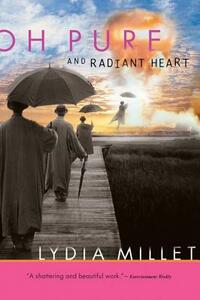You need to sign in or sign up before continuing.
Take a photo of a barcode or cover
I liked the meandering, found family, leisurely road trip style of this novel. It was at times frustrating to follow a seemingly aimless travelling group on a "mission" without a real goal. I think the point of the novel was to showcase the absurd passing of time and the lack of meaning in day to day life... but I think maybe I am not the right audience for this novel. I enjoyed the time capsule aspect of this novel; being written in the early aughts, it captures a world very far removed from our current situation. I enjoyed the author's chapter breaks and information about nuclear power and the bomb interspersed throughout the story. I enjoyed my time with this novel, but I cannot say I would recommend it to everyone.
adventurous
challenging
dark
emotional
funny
informative
mysterious
reflective
sad
tense
medium-paced
Plot or Character Driven:
Character
Strong character development:
Yes
Loveable characters:
Complicated
Diverse cast of characters:
Yes
Flaws of characters a main focus:
Yes
'Oh Pure and Radiant Heart' is a meditation on the irreversible changes to our world after the invention of the first atomic bomb. It's told in the form of a wacky road-trip story about Oppenheimer, Fermi, and Szilard spontaneously finding themselves transported from the spring of 1945 to the 21st century, having 'split off' from their other selves that lived through history and died. It's a credit to Lydia Millet's style that she can tell such a bizarre tale in a stately, dreamlike fashion, rather than as a cartoon.
The three confused scientists shack up with a timid librarian and her skeptical husband in Santa Fe, and ultimately lead a massive convoy traveling the country in support of disarmament, while warding off threats from shadowy government forces and from religious zealots who affirm that Oppenheimer is the second coming of Christ. Throughout this page-turning plot, Millet intersperses the history of nuclear weapons from 20th century to the present day.
As in Millet's subsequent novel 'How The Dead Dream', there is a somber but lyrical obsession with the extinction of a species and with the havoc wreaked on the environment by the human race. There is also an unfortunate tendency in both books to mock the SUV-driving, corn-syrup-eating American masses in a manner that straddles the line between accurate satire and downright misanthropy. But this is mostly overshadowed by OPaRH's haunting, hilarious, epic, and tragic vision. I hope there's a movie.
The three confused scientists shack up with a timid librarian and her skeptical husband in Santa Fe, and ultimately lead a massive convoy traveling the country in support of disarmament, while warding off threats from shadowy government forces and from religious zealots who affirm that Oppenheimer is the second coming of Christ. Throughout this page-turning plot, Millet intersperses the history of nuclear weapons from 20th century to the present day.
As in Millet's subsequent novel 'How The Dead Dream', there is a somber but lyrical obsession with the extinction of a species and with the havoc wreaked on the environment by the human race. There is also an unfortunate tendency in both books to mock the SUV-driving, corn-syrup-eating American masses in a manner that straddles the line between accurate satire and downright misanthropy. But this is mostly overshadowed by OPaRH's haunting, hilarious, epic, and tragic vision. I hope there's a movie.
A book represents an investment in time. A 530-page novel is a lot of time for a slower reader like me, so I don't like finishing a long story with a sigh and a feeling of confused dissatisfaction. I've wanted to read this book for years and it started off captivatingly -- a librarian experiences a traumatic event, and suddenly starts seeing long-dead nuclear scientists roaming her hometown. Great premise. But then, the characters travel to Japan (using fake IDs) and the story sputters out. Pensive librarian Ann and melancholy Robert Oppenheimer-- the novel's only complex characters -- are distracted by a cartoony supporting cast. Yes, we get it -- Leo Szilard is a fat man who likes to eat, Enrico Fermi is depressed, Larry is a stoned surf bum, Tamika is a space cadet. It's hard to care about any of them, and by page 400 you're with Ann's bedraggled husband Ben -- rooting for it all to be over so everyone can just go home. The novel's small suspense in the form of mysterious black ops men following the scientists around the globe gives way to a boring plot turn about right-wing End Times true believers following the scientists around until it collapses into a convenient Deus ex machina that leaves Ann, well, pensive and maybe drinking a little more. I wish I'd been more moved, in the end.
I read this book for grad school and HATED it. I later heard that the author further edited the book down, so maybe it got better. I think our teacher only assigned it because the author was a friend of hers. Yuck.
this was a five-star book for me all the way until the last third, when it (for me, anyway) spun out of control. despite the fact that i was disappointed by the end, i'd still recommend this novel to most anyone. it's provocative, touching, and wickedly funny all at once. it is rare for a book to have me laughing out loud on the subway, but the image of leo szilard quoting ice-t did me in. millett skillfully weaves plot with historical "facts" and in the resurrected scientists creates charming characters you actually care about (rare for late 2oth/21st century novels, as far as i'm concerned!). i'm definitely going to look into her other novels.
It feels odd to rate a book five stars when I am sitting here feeling so forlorn after finishing it.
Then again, this was a weird roller coaster of a reading experience for me and I loved every second of it.
Once again, Lydia Millet made me think and feel, and then left me reeling. And once again I love her for it.
Then again, this was a weird roller coaster of a reading experience for me and I loved every second of it.
Once again, Lydia Millet made me think and feel, and then left me reeling. And once again I love her for it.
Kind of ironic that I finished this book just days before the anniversary of Hiroshima bombing. It was a little strange reading this book. I loved it in the beginning, felt it was "ok" in the middle, and absolutely hated it towards the end. I felt that the character of Ann was useless. It felt like she was a piece of furniture or a vase that noone wants to toss out, yet noone knows what to do with it. As much as fictional this story is, I still wanted to believe it. It wasn't believable at all. It could probably be a good book if it was about 300 pages less than it is now.
adventurous
challenging
dark
funny
reflective
fast-paced
I know the absurdity of the premise of this book is not for everyone, but if you can suspend disbelief and let yourself exist within this world, it is imaginative, thought provoking, and beautifully written
challenging
emotional
hopeful
informative
inspiring
reflective
sad
tense
slow-paced
Plot or Character Driven:
A mix
Strong character development:
Yes
Loveable characters:
Complicated
Diverse cast of characters:
Complicated
Flaws of characters a main focus:
Yes
I don’t often review books, but Lydia Millet is an excellent writer. This is my first book by her, and probably the best book I’ve read all year. Take your time and have patience for these characters. Make sure your suspension of disbelief is strong, and your love for others is primed to be expanded. The last sentence was beautiful and devastating. Perfect for any fan of literary fiction.







